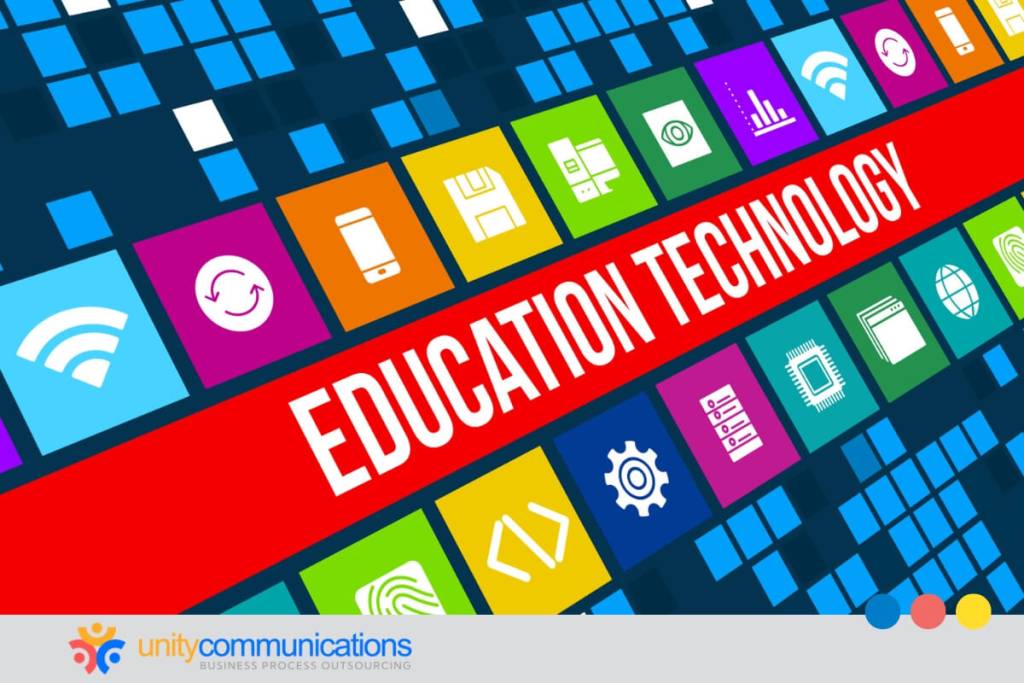IN THIS ARTICLE
Table of Contents
The need for accessible, personalized, and scalable learning solutions has transformed the education technology (EdTech) sector. However, developing and managing industry-specific products is complex and resource-intensive. This is where business process outsourcing (BPO) comes in handy.
BPO allows companies to streamline operations, access specialized expertise, and accelerate growth. From content development and technical support to data analysis and customer service, BPO solutions support how EdTech providers develop, deploy, and manage their platforms.
Read on to discover the innovative ways BPO in the education technology sector unlocks new potential for learners and educators.
Role of BPO in the education technology sector

What is BPO’s role in education technology? BPO services can oversee content development and management, software development, technical assistance, and information technology (IT) infrastructure to streamline operations on behalf of educational institutions.
Outsourcing specific functions in developing, deploying, and managing EdTech solutions can optimize business processes, improve quality, and enable rapid scaling.
Below are the primary roles of BPO in the education technology sector:
- Content development and instructional design: External curriculum experts, multimedia developers, and instructional designers can create high-quality educational content, e-learning modules, and interactive resources. Outsourcing allows you to leverage global expertise in different subjects.
- Translation and localization: BPO experts can localize educational tech platforms expanding into international markets. For example, they can align the applications with the location’s language and culture to broaden their reach and provide personalized learning.
- App and platform development: Outsourcing software engineering for mobile apps, learning management systems (LMS), and other digital tools can accelerate development timelines. Third-party UI/UX design teams can create intuitive, easy-to-use, learner-centered interfaces.
- Maintenance and updates: EdTech companies can outsource software updates, bug fixes, and system maintenance to ensure the platforms run smoothly and remain up-to-date with technology trends.
- Help desk and technical support: BPO in the education technology sector can manage 24/7 customer support for students, educators, and institutions, handling inquiries, troubleshooting issues, and offering real-time assistance. Support services can also assist new user concerns with account setup, platform features, and training.
- Content moderation and course management: For education services that offer user-generated content or instructor-led courses, BPO course managers and content moderators can produce relevant, high-quality content aligned with platform standards.
- Learning analytics: BPO firms can help maximize learning analytics by customizing educational content based on student performance and behavior.
- Billing and payment processing: Outsourcing financial operations such as invoicing, billing, and payment processing can streamline administrative tasks.
- Cybersecurity: Outsourcing cybersecurity can help protect sensitive educational data from threats and breaches, providing safe environments for learners and institutions.
How BPO helps develop, deploy, and manage EdTech solutions
BPO in the education technology sector brings a wealth of experience in optimizing processes. BPO best practices can significantly enhance the development, deployment, and management of your EdTech solutions.
Here are the best practices that BPO firms follow to deliver high-quality results:
- Agile methodologies: BPO often uses agile frameworks for software development for quick iterations, continuous feedback, and faster time to market. This helps EdTech companies keep up with the rapidly changing technology landscape. For 61% of companies, agile is also beneficial for creating a more open and productive culture.
- Continuous integration and deployment: BPO providers can automate development and deployment pipelines to reduce errors, improve efficiency, and roll out new features and updates more quickly.
- Performance analytics: BPO leverages advanced analytics tools to assess the performance of EdTech solutions. This includes monitoring student engagement, learning outcomes, and platform performance to inform decisions about future developments and updates.
- A/B testing: To continuously improve EdTech products, BPO providers can perform A/B testing to evaluate different versions of features, content, or user interfaces and implement the most effective solutions.
- Automated testing: BPO in the education technology sector uses automated quality assurance testing to quickly identify and resolve issues in the codebase and reduce the chances of bugs or performance problems during deployment.
- User experience testing: A well-executed UX design can triple website conversion rates. Similarly, BPO teams go beyond functional testing to conduct usability testing, ensuring platforms are intuitive and user-friendly for key stakeholders. By refining the user experience, BPO teams contribute to increased engagement and platform success.
- Dedicated project managers: BPO companies assign experienced managers to oversee timelines, budgets, and deliverables. They ensure that all aspects of the EdTech development cycle stay on track and meet quality standards.
Benefits of integrating BPO in the education technology sector

Integrating BPO in the education technology sector offers several benefits that enhance technology solutions’ efficiency, scalability, and overall performance. Here are key BPO advantages:
- Faster deployment speed: BPO providers utilize agile methodologies, experienced tech teams, and automation tools to bring products to market more quickly and adapt to changing demands with shorter development cycles.
- Optimized content development and management: Outsourcing curriculum design, multimedia content creation, and localization to specialized teams ensures high-quality, engaging, and culturally relevant materials that can reach a global audience.
- Streamlined IT support: BPO in the education technology sector offers comprehensive technical support and maintenance services to minimize downtime and provide users uninterrupted access to learning tools.
- Scalable customer support solutions: BPO providers can manage multichannel, round-the-clock customer support to handle inquiries, technical issues, and user onboarding, scaling the service to accommodate growing user bases.
- Compliance with educational standards and regulations: BPO vendors ensure that EdTech solutions adhere to local and international laws, such as the Family Educational Rights and Privacy Act (FERPA) and accessibility standards.
- Reduced operating costs and increasing return on investment (ROI): Outsourcing allows you to reduce labor costs by 70%, improve efficiency, and focus on strategic growth areas, leading to higher ROI.
- Enhanced user experience through continuous feedback and improvement: A reliable outsourcing partner can provide data-driven insights and user feedback analysis to refine features, improve content, personalize learning experiences, and better meet user needs.
Strategies to leverage BPO for the education sector
To fully harness the power of BPO, institutions and EdTech companies must implement strategic approaches that align with the goals for innovation, scalability, and efficiency.
Here are some essential strategies:
- User feedback collection and analysis: Regularly gather user feedback through BPO services that manage surveys, reviews, and focus groups. Use the insights to improve platform features, course content, and user experience.
- Innovation through collaboration: Collaborate with BPO partners to integrate new technologies such as virtual reality (VR), gamification, and artificial intelligence (AI), which can enhance the learning experience and keep the platform competitive.
- Artificial intelligence-powered content development: Partner with BPO firms specializing in AI-driven content creation to develop adaptive learning systems that tailor lessons and materials to individual students’ needs and abilities.
- Scalable support during peak times: Outsourcing customer service to scale up during peak periods (such as enrollment seasons or platform launches) ensures that users receive timely support without overburdening internal teams.
- Data-driven decision-making: Use BPO services for data collection, analytics, and reporting to track student progress, engagement, and outcomes. Data-driven insights can inform curriculum updates, user experience enhancements, and instructional strategies.
The bottom line

Strategically outsourcing help desk, content moderation, instructional design, and software development enhances the deployment and management of your EdTech solutions. It allows you to stay agile, scalable, and innovative in a competitive market.
BPO in the education technology sector enhances operational efficiency and contributes to the continuous improvement of educational platforms, creating better learning experiences for users worldwide.
Ready to start utilizing BPO for education technology? Let’s connect!





